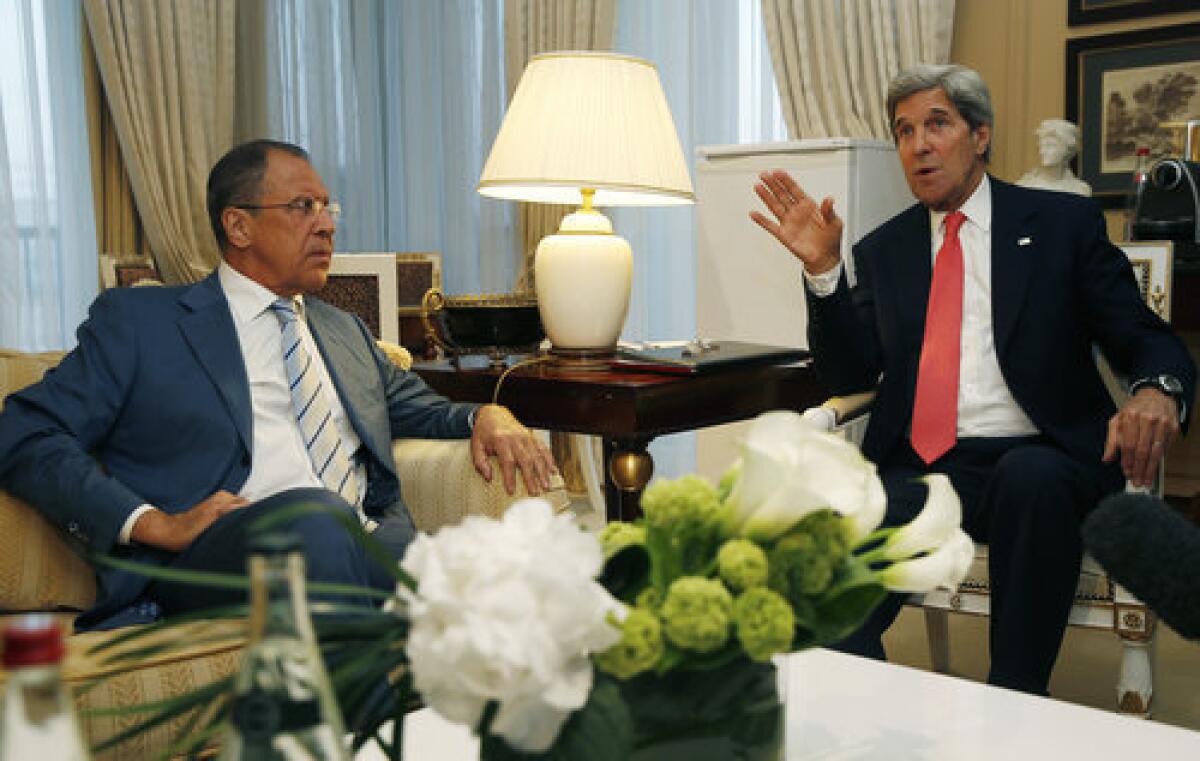Russians hedging their bets on prospects for Syrian peace accord

- Share via
Russian officials are working diligently with U.S. counterparts to revive collapsed peace talks on Syria’s future after more than two years of bloody civil war.
But Moscow also has threatended to ship sophisticated anti-aircraft missiles to the government of Syrian President Bashar Assad, which has been accused of committing atrocities, including using chemical weapons, in its crackdown on insurgents. Syria is the Kremlin’s closest ally in the Middle East.
Russia looks duplicitous to many in the West, who suspect that its leaders are paying lip service to the desire for a negotiated solution while strengthening Assad’s ability to press on with the fight that has killed more than 80,000 people.
Moscow, however, may only be preparing for what it sees as an inevitable need for a Plan B: Helping the Syrian government deflect Western military intervention if the planned peace conference in Geneva next month never materializes or fails to bring the two sides any closer together if it does.
Syrian government forces have been rolling up territory in the battles around the strategic city of Qusair, gaining momentum at the expense of the increasingly divided and outgunned opposition forces. That shifting balance on the battlefield may be emboldening Assad to believe his forces can fight their way to victory. It has also encouraged the European Union to end its embargo on shipments of arms to the insurgent forces fighting Assad, on the theory that the threat of Western weapons or intervention might force the Syrian government to negotiate seriously at the talks in Geneva.
Russian officials were quick to denounce the EU vote Monday to allow its arms embargo to expire. Russian Foreign Minister Sergei Lavrov, in Paris to meet with U.S. Secretary of State John Kerry for preparations on the still-unscheduled Geneva conference, called the EU decision “illegitimate” and potential interference in the sovereign affairs of an independent nation. Russia’s representative at the North Atlantic Treaty Organization headquarters in Brussels, Alexander Grushko, reiterated the Kremlin’s warning that more arms entering Syria “just adds fuel to the fire.”
So why shouldn’t Russia’s plan to deliver S-300 missiles to Assad’s military draw the same condemnation?
Deputy Foreign Minister Sergei Ryabkov told journalists in Moscow that the Syrian rebels have no air force, so the anti-aircraft S-300s wouldn’t change the materiel balance between Assad and his opponents. They would serve as a deterent to forces outside Syria who may be contemplating intervention, and they would bolster the Damascus government’s defenses in the event the United States or its allies attempt to assert their air power on behalf of the rebels.
“We believe that such steps to a large extent help restrain some ‘hotheads’ considering a scenario to give an international dimension to this conflict,” Ryabkov said, calling the prospective missile transfer a “stabilizing factor,” according to the Russia Today network.
Some Middle East analysts have criticized Moscow’s pledge to deliver arms to the Syrian government, warning that the weapons boost will ease what little pressure is on Assad to negotiate in good faith when and if his envoys sit down with the rebels in Geneva.
Others point out that the S-300s, though enhancing Assad’s current surface-to-air capabilities, are hardly weaponry that will preclude options of supporting the rebels with a no-fly zone or other aerial protection.
“I don’t think anyone is quaking in their boots at the idea that the regime could get a few S-300s,” said Kori Schake, a former National Security Council official now at Stanford’s Hoover Institution.
Western officials tend to exaggerate Russia’s role in the Syrian conflict and its influence with Assad, said Andrew Weiss, director of the Rand Center for Russia and Eurasia.
“The Iranians are playing several orders of magnitude a greater role in supporting the regime,” Weiss said of weapons and fighters coming to Assad from the Islamic Republic.
“There is a genuine sense in Moscow that Assad may prevail militarily. There is also real fear that a failed state, or a failed society in Syria, could have hugely destabilizing effects throughout the region, including in Russia’s North Caucasus,” Weiss said.
Russia is still smarting from the U.S.-led intervention that ousted longtime ally Moammar Kadafi from the Libyan leadership two years ago. That has made the Kremlin wary of outside forces attempting to change the battlefield dynamics, or to use their influence in the U.N. Security Council to sanction countries for human rights violations that Russia considers interference in domestic affairs.
Weiss sees U.S. and European governments as hiding behind Russia’s actions to avoid more forceful moves to aid the rebels, who are geographically scattered and fighting with conflicting agendas. One of the greatest deterrents to Western supply of arms is the fear they could end up in the hands of factions aligned with Al Qaeda and other terrorist groups.
“At this point it is convenient to say that Russia is preventing us from moving to help the Syrian opposition, because of its Security Council vetoes,” Weiss said, referring to Russian and Chinese votes scuttling censure and sanctions against Assad. “But that’s really an alibi rather than an impediment for any U.S.-led intervention. There is no appetite for that in Washington.”
ALSO:
Sheldon Adelson discusses Palestinians, peace efforts
One dead in latest shooting of polio workers in Pakistan
Family of suspected London terrorist expresses ‘shame and distress’
A foreign correspondent for 25 years, Carol J. Williams traveled to and reported from more than 80 countries in Europe, Asia, the Middle East and Latin America.
More to Read
Sign up for Essential California
The most important California stories and recommendations in your inbox every morning.
You may occasionally receive promotional content from the Los Angeles Times.














